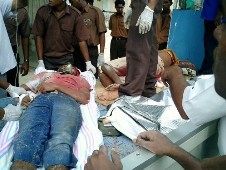Cabinet has decided to investigate who gave the order to shoot inmates in Maafushi jail in September 2003, an incident in which three inmates died.
Further details were not mentioned, and Press Secretary for the President’s Office, Mohamed Zuhair, did not respond to Minivan News at time of press.
In June this year three of the 12 former prison guards sentenced to death – who were living at large – were arrested by police for the enforcement of their 25 year sentence.
During the trial, 13 guards were accused of murdering three inmates and all were found guilty of the crime and sentenced to death by the Criminal Court.
The 13th person, the head of the prison that time, was later pardoned by the High Court. Former President Maumoon Abdul Gayoom then used presidential privilege to commute the death sentences of the others to 25 year imprisonment.
 State Home Minister Mohamed Naeem told Minivan News in June that the documents at the Home Ministry showed that the 12 officers were at first kept in Maafushi Prison until the new prison head sent a letter to the-then Home Minister Ahmed Thasmeen Ali – now the leader of the opposition – that it was unsafe for the 12 to be among the other inmates.
State Home Minister Mohamed Naeem told Minivan News in June that the documents at the Home Ministry showed that the 12 officers were at first kept in Maafushi Prison until the new prison head sent a letter to the-then Home Minister Ahmed Thasmeen Ali – now the leader of the opposition – that it was unsafe for the 12 to be among the other inmates.
“They were then transferred to Dhoonidhoo prison, and after two months another letter was sent to Thasmeen from the then Deputy Police Commission saying that there were no lawful grounds for keeping convicts in Dhoonidhoo for the implementing of their verdicts,” he said. “And that was the end of the document trail. We do not know what Thasmeen said in reply, or how they managed to stay at large.”
Prison guards at Maafushi claimed to have shot the inmates to control a prison riot sparked by the custodial death of fellow inmate Evan Naseem, who allegedly died of injuries sustained during the brutal torture he was subjected to inside the prison. His death – and his family’s decision to display the body and his injuries – is considered a watershed moment in Maldivian politics that led to the ousting of the former President.